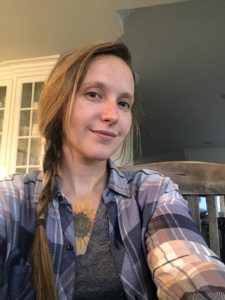On Fullness by Kari Treese
On Fullness
Kari Treese
I was reading about dark matter in Chandra’s Cosmos, by Wallace Tucker. I discovered the volume on a bookshelf in the Seattle Public Library. Chandra is a telescope. He is the most powerful X-ray telescope to ever plumb the depths of the universe. Here is what we know. Dark matter cannot be seen, but its gravitational force is detectable. It is invisible to all our current methods of seeing, but we know it exists because of how it pulls other entities to itself.
I fell in the ocean once. A wave caught the back of my thighs, the weight and rush throwing me off balance and into the sand. I rolled and writhed. I crawled forward, hands gripping sand. The sand was everywhere, cemented to my skin, embedded in my scalp for days.
Most matter is this dark stuff that we cannot see, cannot understand—this is, to use Tucker’s word, humbling, because we understand so very little of the space we inhabit. We do not know what this dark matter is—we have no way to define its composition or identify what makes it up, yet it holds galaxies together. Galaxy clusters would fly apart without it. I imagine dark matter as everything we do not think or say but hangs over us, linking our lives.
Some days, I just need to see the ocean, its choppy ridge rolling toward nothing and away from nothing, fading into the sky. I think the sight of the white foam on the waves churning all that life reminds me that I could walk into it and lose myself. I think the color, the way it slips into sky, reminds me of the way the world eventually overwhelms everyone and everything. It reminds me that we all drown, that everything is in a constant state of passing, withering, sliding away on the tide. I think it reminds me of people who have gone. When I smell the sea, I remember the people I love who have left me.
Scientists once assumed that the space near a black hole was empty, devoid of anything, any matter. Stephen Hawking posited that this empty space, the vacuum near a black hole, isn’t really empty at all. Rather, there are virtual particles that pop in and out of existence, using and replacing energy. The particles jump into and out of existence in harmonious pairs. This space, once believed “empty,” is full of illusory stuff that is both there and not there.
I sat in the sand drinking it in, breathing the spray off the waves, watching my son shape angels on the bank with his arms and legs. My daughter sat in between my knees using my heat and her shirt to keep the chill of the breeze away. She said, I love life. I love living. Her sigh and sweet sing-song voice, seeing what I see in the ocean.
Then there is this: Hawking showed that these virtual particles that populated the vacuum near a black hole might become real—pop in and never pop back out again—if its partner particle is sucked into the black hole before it pops out.
The water makes us both think about bigger things. It would be so sad, she said, if you were dead. I don’t think she meant me, but I think her voice saved me. I think the ocean reminds me of living. It reminds me of falling asleep and waking up.
© 2019 Kari Treese
=====
 Kari Treese is an MFA candidate at Mills College in prose. Her work has appeared in The Los Angeles Review, Punctuate, Goat’s Milk, and is forthcoming in the anthology, Far Villages: Welcome Essays for New and Beginner Poets, from Black Lawrence Press. Kari has been a mother, customer service representative, and math teacher. Find her inside drinking coffee and reading books.
Kari Treese is an MFA candidate at Mills College in prose. Her work has appeared in The Los Angeles Review, Punctuate, Goat’s Milk, and is forthcoming in the anthology, Far Villages: Welcome Essays for New and Beginner Poets, from Black Lawrence Press. Kari has been a mother, customer service representative, and math teacher. Find her inside drinking coffee and reading books.
Join our community
Get the book
